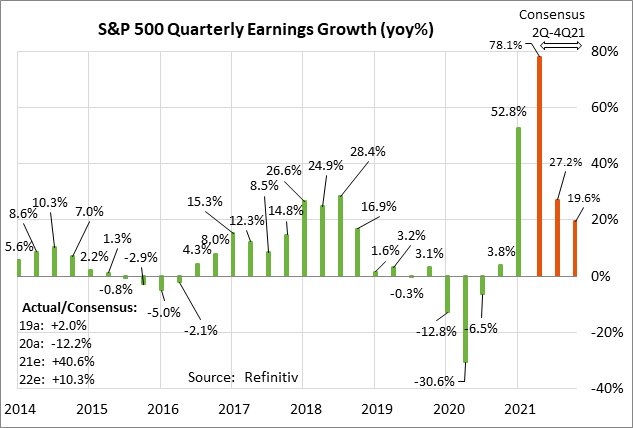- Weekly global market focus
- Bipartisan infrastructure bill may get another vote this week
- FOMC’s consideration of QE tapering may be slowed by the Delta variantÂ
- Rising U.S. Covid infection rate sparks worries about slower economic growth
- Q2 earnings season hits peak week
Weekly global market focus — The U.S. markets this week will focus on (1) the outcome of the Tue/Wed FOMC meeting, (2) whether the U.S. Covid infection rate continues to climb due to the Delta variant, (3) the peak Q2 earnings week with 177 reporting SPX companies, (4) the Treasury’s sale of $211 billion of T-notes today through Thursday, and (5) this week’s busy U.S. economic calendar that kicks off with today’s June new home sales report (expected +4.0% after May’s -5.9%).
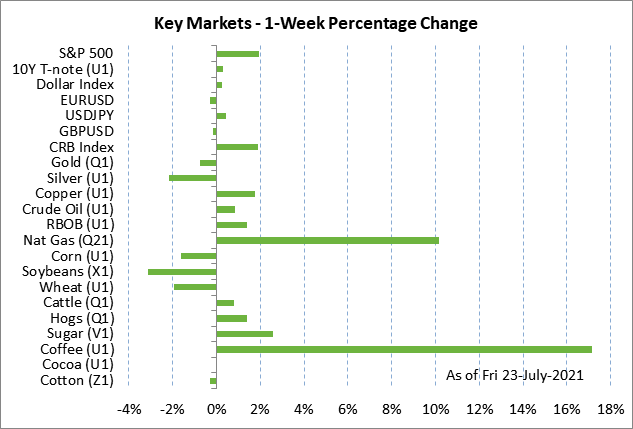
Bipartisan infrastructure bill may get another vote this week — The bipartisan group of Senators is hoping to reach a final agreement on an infrastructure bill and have the legislative text and the CBO’s scoring available by today or early this week. If the bill has the support of at least 10 Republican Senators to overcome a filibuster, then Senate Majority Leader Schumer has said that he will hold another cloture vote for bringing the bill to the Senate floor for debate. That cloture vote could happen sometime this week.
The bipartisan infrastructure bill has slowed the Democrats’ consideration of the $3.5 trillion budget resolution since Democrats are unsure whether they will need to cover the $579 billion of spending contained in the infrastructure bill. Also, Senate Budget Committee Chairman Bernie Sanders has to make sure he has all 50 Democratic Senators on board with the $3.5 trillion budget resolution since the resolution won’t pass if even one Democratic Senator is opposed.
Mr. Sanders has said he may not have the budget resolution ready for a vote until early August. The Senate is currently scheduled to leave for its summer recess next Friday (August 6) and not return until after Labor Day. Passage of the budget resolution will set the stage for a $3.5 trillion reconciliation bill that will be considered by the Senate this autumn.
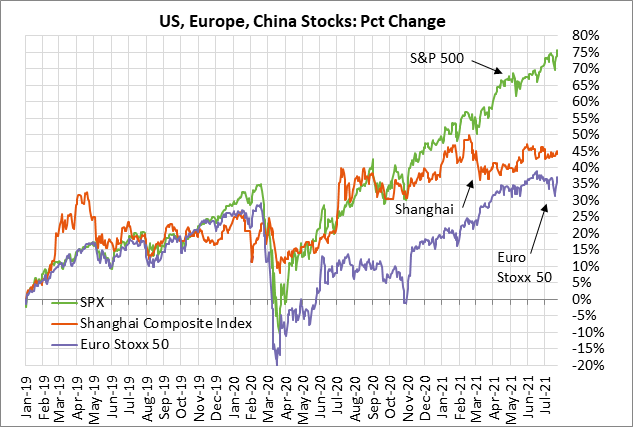
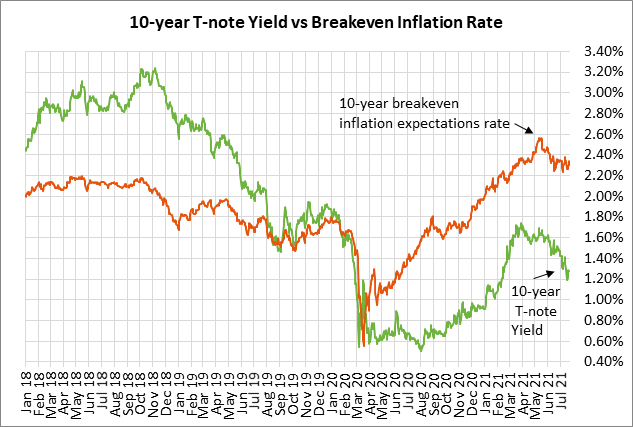
FOMC’s consideration of QE tapering may be slowed by the Delta variant — The FOMC at its meeting on Tuesday and Wednesday is expected to continue the QE tapering discussion that began at its last meeting on June 15-16. However, the FOMC this week is not expected to announce that it is close to QE tapering. Instead, the FOMC is likely to continue to stress that the conditions have not yet been met for QE tapering.
The FOMC this week may even sound a bit more dovish than its June meeting since U.S. Covid infections have more than tripled since the June meeting. The Delta variant is a worrisome development for the Fed since there is no way to tell when the current spike in new infections may end. The Fed is not likely to proceed with QE tapering until the Delta variant has been contained and infections are down to a relatively low level.
Prior to the Delta variant, the markets were generally expecting the Fed to give an early warning of QE tapering at either the August Jackson Hole conference or the September 21-22 FOMC meeting. However, the Delta variant may push that schedule back by at least 1-2 months, depending on the course of the pandemic.
The markets in the past several weeks have significantly scaled back expectations for Fed tightening. The market is not expecting the Fed’s first +25 bp rate hike until 2023, which is about 1-1/2 years away. On a yield basis, the Dec 2023 federal funds futures contract in the past three weeks has eased by 14 bp to 0.66%, which means the market is discounting just 56 bp of tightening through the end of 2023 from the current effective federal funds rate of 0.10%.
Rising U.S. Covid infection rate sparks worries about slower economic growth — The U.S. Covid infection rate continues to rise and cause market worries about weaker U.S. economic growth. U.S. Covid infections have tripled in just the past month as the Delta variant sweeps the country. The 7-day average of new U.S. Covid infections last Friday rose to a new 2-3/4 month high of 49,683 cases, which is more than quadruple the 16-month low of 11,351 posted just a month ago on June 23.
The CDC reports that 49.1% of the U.S. population is now fully vaccinated, and 56.8% have received at least one dose. Bloomberg reports that the U.S. has administered a daily average of 590,100 vaccination doses over the past week, which is a little higher than recent weeks as warnings about the Delta variant may be sparking increased interest in getting vaccinated.
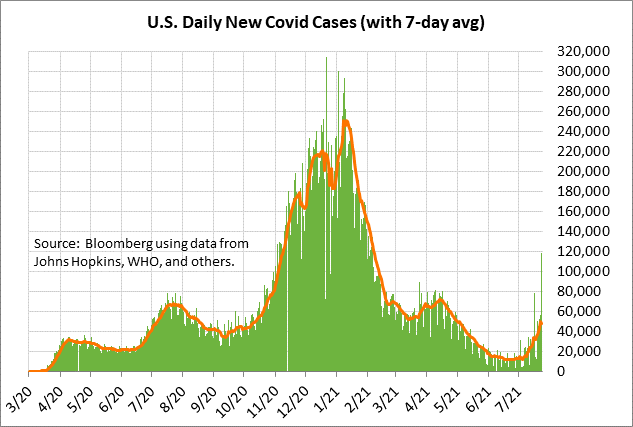
Q2 earnings season hits peak week — Q2 earnings season hits its peak this week with 177 of the S&P 500 companies reporting. Earnings season will remain busy next week, with 130 companies reporting.
Notable earnings reports this week include: Tesla on Monday; Alphabet, Apple, Microsoft, Visa, Starbucks, UPS, and PulteGroup on Tuesday; Facebook, Paypal, Expedia, and Ford on Wednesday; Amazon.com and Mastercard on Thursday; and Caterpillar and Exxon Mobil on Friday.
Q2 earnings season has so far been very strong, with 88.3% of the 120 reporting companies in the S&P 500 having beaten the market consensus, which is well above the long-term average of 65.5% and the 4-quarter average of 83.4%, according to Refinitiv.
The consensus is for Q2 earnings growth of +78.1% y/y for the S&P 500 companies, which is much better than the consensus of +65.4% as of July 1. The year-on-year figure is, of course, inflated by the fact that earnings dropped sharply in Q2-2020 during the height of the pandemic economic shutdowns, causing a very low year-earlier base. For all of 2021, the consensus is for earnings growth of +40.6%, more than recovering from the -12.2% decline seen in 2020.
